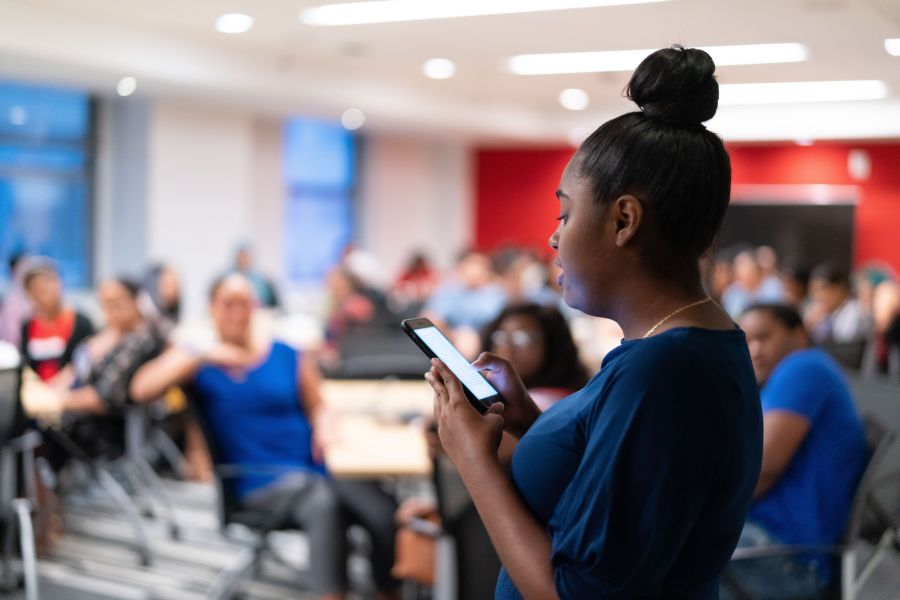(NewsNation) — A concerning trend among high school students — particularly low-income students — has been dubbed the “summer melt” meaning students who are accepted into college fail to enroll, based on missed financial aid or a lack of support. A program in New York is trying to close that gap, tapping college students to act as mentors.
One of those college students is Nataly Toro. When she was in high school and thinking about going to college, she didn’t have a lot of support. Out of a senior class of around 150 people, the school had just one college counselor.
“That’s a lot of students for one person to see and meet,” she said.
What Toro did have was a mentor enrolled in college who could explain in real-time the benefits of higher education.
Her mentor was part of a program called College and Career Bridge for All (commonly referred to as Bridge) run by the City University of New York (CUNY) in partnership with the city’s public school system.
Toro’s mentor helped with her college application and she brushed up on professional skills like thoroughly reading emails.
“It’s more relatable to talk to someone who is only two or three years older than you than talking to your mom who’s probably like 20 or 30 years older than you,” she said.
As a first-generation college student, Toro was able to talk to people who had been through the process.
After successfully making it to college, she decided to become a mentor coach with Bridge to help other high school students. She believes that the program lets high schoolers speak to people they can relate to about their aspirations.
The goal of Bridge is to combat the “summer melt,” by enlisting mentors to support them during the process.
‘Near-peer’ guides
“We hear over and over again from students that … when they interact with that coach for the first time, it breaks down some of the fears that they have built up about whether or not they can do this,” said Andrea Soonachan, the university dean for K-16 initiatives at CUNY.
The program began in 2017 and within two years began serving over 10,000 students in New York City schools. Today, the program has more than 200 coaches who serve as “near-peer mentors,” working with around 55,000 students.
Coaches earn $20 an hour and are expected to work 15 hours a week; before they begin mentoring students, they receive about 50 hours of training. Bridge is intentional about trying to assign coaches to students who come from the same boroughs of the city as they do.
Each coach is assigned a caseload of between 250 and 350 students, and they are tasked with guiding through the college enrollment process. The majority of the advising coaches offer high school students is done remotely.

Students are first given ongoing advice through text messages and newsletters.
The newsletters, which are sent out through email, are tailored to students’ needs based on what the program knows about them.
“Those students that we know are going to college are getting resources around, hey, complete your FAFSA … here are links you can check out,” said Pahola Capellan, who serves as the director of Bridge.
Students who want personalized mentoring can engage directly with coaches.
“A student can access their coach from their couch from wherever they may be via text, giving them a quick phone call or jumping into a Zoom,” Capellan said.
Earlier this year, researchers at CUNY released a study of Bridge that showed its impact on college matriculation.
“It increased college enrollment within six months from high school graduation by seven percentage points,” said Vivian Liu, one of the researchers.
Building trust
One of the challenges in running the program is engaging the students. Although Bridge proactively reaches out to thousands of students every week, not every student responds and seeks personalized mentoring. Coaches have to work to win over students’ trust.
“That is the biggest hurdle — that it’s really easy for this to feel like a scam. Oh, who are you? Why are you texting me?” Capellan said.
Capellan was heartened, however, by the fact that Bridge mentors have gained access to official CUNY email addresses in the past year, which has helped give their outreach more legitimacy in the eyes of students.
Toro enjoyed the experience of being coached and coaching so much that she is now planning to become a college counselor. She encourages all New York students to look into Bridge.
“It’s a wonderful program and we’re here to help students. I’m just happy to have been a student, to have been a Bridge coach…to just kind of give back to the community,” she said.

